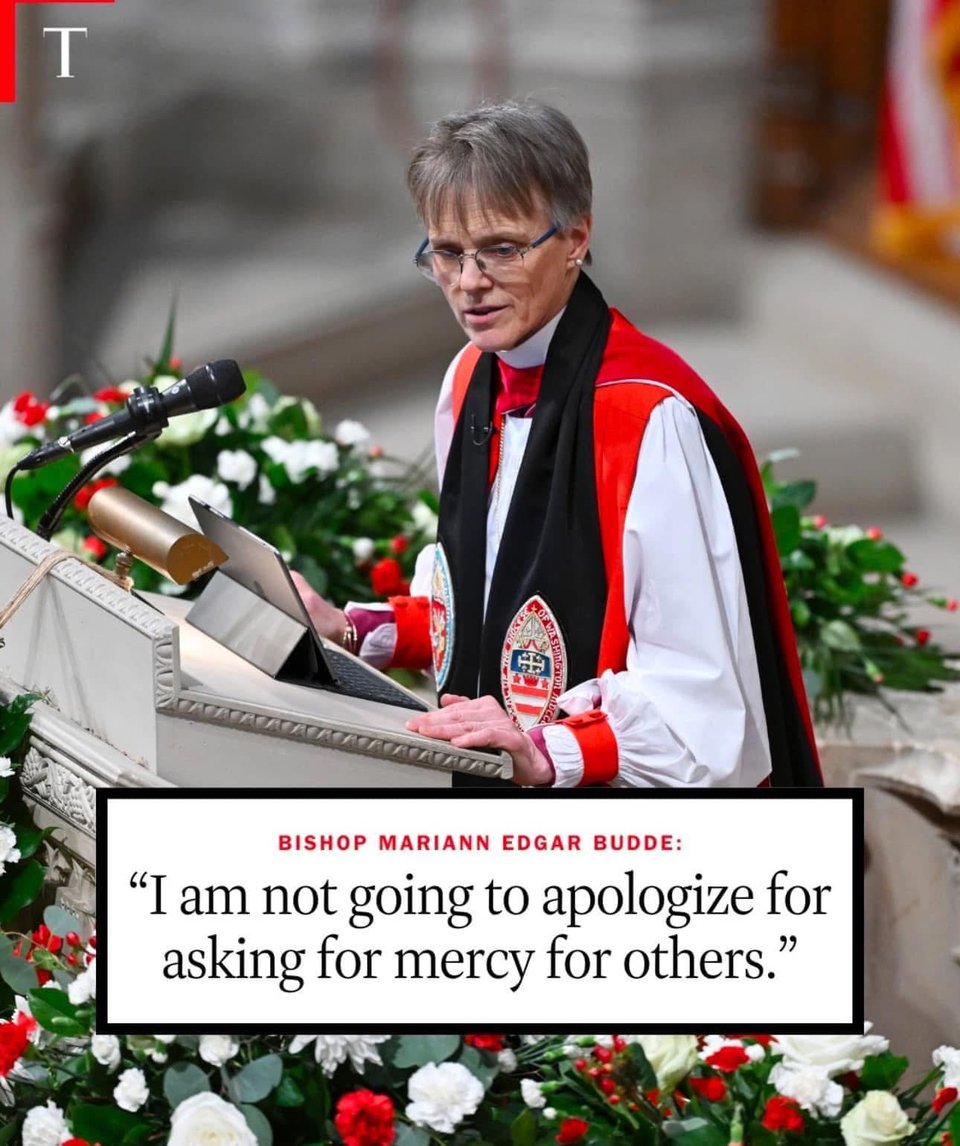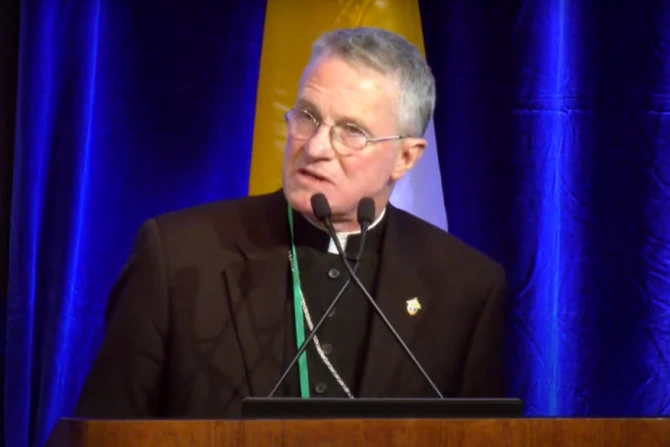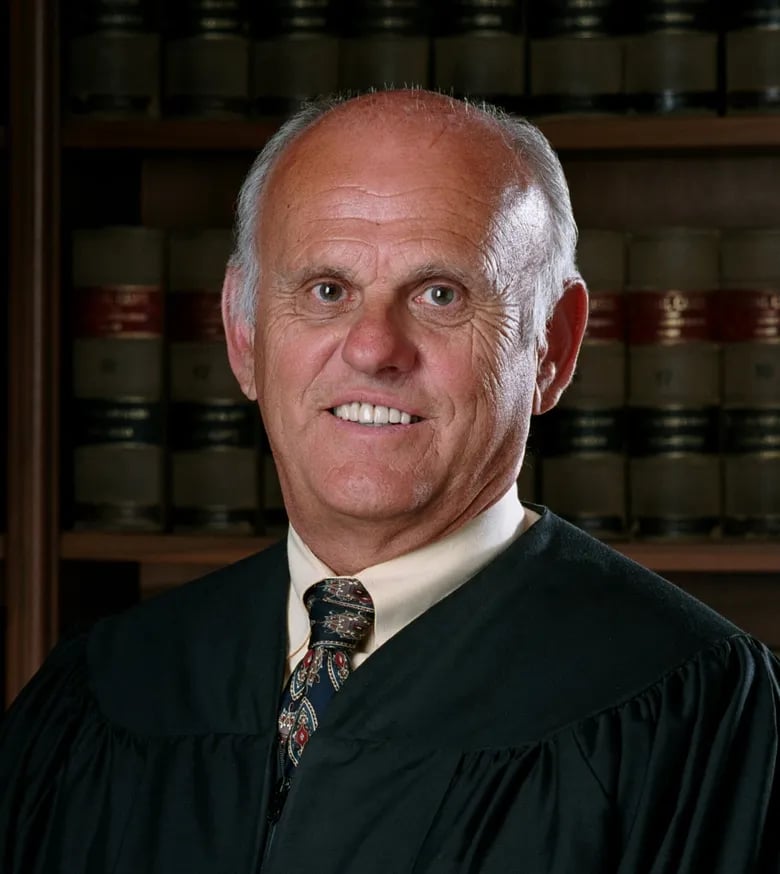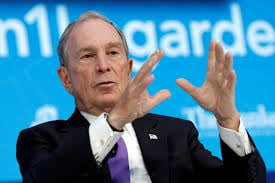Friday, January 24, 2025. Annette’s News Roundup.
Correction.
Every day, remember.
January 20, 2025. A beast entered the White House.
January 20, 2025. The brutal takeover of America began.
January 20, 2025. We continue to fight.
This Roundup offers more evidence that Trump will lose.
We will win.
Donate. Volunteer. Write to elected officials. Write an article, an email, a letter or social media post. Talk to a neighbor or someone you just met. Run for office or help someone running for office. Congratulate someone who has acted bravely for Democracy.
Fight back! Do something to stop Trump or praise others stopping Trump once a day.
“I am not going to apologize for asking for mercy for others.“
Bishop Budde presents “an alternative to the culture of contempt.”

‘I Am Not Going to Apologize’: The Bishop Who Confronted Trump Speaks Out?
President Donald Trump lashed out on Wednesday at the bishop who had delivered a pointed plea directly at him on behalf of immigrants and LGBTQ+ children during a service at the National Cathedral a day earlier.
In a post on Truth Social, Trump called the Episcopal Bishop of Washington, Mariann Edgar Budde, a “Radical Left hard line Trump hater” who is “not very good at her job.” He said she “brought her church into the World of politics in a very ungracious way” and demanded an apology.
Budde’s sermon may have been the only critical words Donald Trump heard during his first full day in office.
As Trump sat in the first pew of the National Cathedral on Tuesday during a traditional prayer service, Bishop Budde asked Trump “to have mercy upon the people in our country who are scared now.” Trump glared and shifted uncomfortably as she spoke.
“There are gay, lesbian and transgender children in Democratic, Republican, and Independent families, some who fear for their lives.” In his first hours as President, Trump signed an order recognizing “two sexes, male and female,” and saying those are set at birth and cannot be changed. He also ordered immigration officers to ramp up deportations of people in the country without authorization.
Budde said in her sermon that those being targeted for deportation “may not be citizens or have the proper documentation, but the vast majority of immigrants are not criminals. They pay taxes and are good neighbors. They are faithful members of our churches and mosques, synagogues, gurudwaras and temples.” She added, “I ask you to have mercy, Mr. President, on those in our communities whose children fear that their parents will be taken away.”
Since her sermon drew national attention on Tuesday, Budde tells TIME she has “heard from many people who are grateful that someone was willing to speak on their behalf” as well as those who “have said they do wish me dead, and that's a little heartbreaking.”
Budde has served as bishop of the Episcopal Diocese of Washington since 2011. She was also critical of Trump in 2020 when he ordered racial justice protestors to be forcibly removed from Lafayette Park and the courtyard of St. John’s Church and then posed there for a photo while holding a Bible.
In an interview with TIME, Budde described her reaction to the blowback and Trump calling her out. This interview has been edited for length and clarity.
TIME: Are you comfortable with being this well known nationally?
BISHOP BUDDE: I hope that a message calling for dignity, respecting dignity, honesty, humility and kindness is resonating with people. I'm grateful for that. I'm saddened by the level of vitriol that it has evoked in others, and the intensity of it has been disheartening. I've heard from many people who are grateful that someone was willing to speak on their behalf, and also others feeling emboldened to do the same, and I'm grateful for that.
I'm not comfortable with the — I don't know how to describe it — but I'm perfectly happy to be in conversation with people who disagree with me. The level of attack has been sobering and disheartening.
Are you hoping to inspire others to push back against President Trump's policies?
I would love to have people present another alternative, yes, and to bring compassion and breadth into our public discourse.
Trump called you a "Radical left hard line Trump hater." What's your response to that?
I don't hate President Trump. I strive not to hate anyone and I dare say that I am not of the 'radical left' either, whatever that means. That is not who I am.
He said you're not very good at your job.
That is for other people to judge, and so he is certainly entitled to his opinion.
And he said you should apologize. Will you apologize?
I am not going to apologize for asking for mercy for others.
Have you received threats? Do you feel in danger?
The real people who are in danger are those who are fearful of being deported. The real people who are in danger are the young people who feel they cannot be themselves and be safe and who are prone to all kinds of both external attacks and suicidal responses to them. So I think we should keep our eyes on the people who are really vulnerable in our society.
I have a lot of support and a lot of safety around me, so no, I'm not feeling personally at risk. Although people have said they do wish me dead, and that's a little heartbreaking. It was a pretty mild sermon. It certainly wasn't a fire and brimstone sermon. It was as respectful and as universal as I could with the exception of making someone who has been entrusted with such enormous influence and power to have mercy on those who are most vulnerable.
Anything else?
I think it's all of us, you know. I think it's not about me. It's about the kind of country we are called to be. And that's what I did my best to try and speak to, to present an alternative to the culture of contempt, and to say that we can bring multiple perspectives into a common space and do so with dignity and respect. And that we need that, and the culture of contempt is threatening to destroy us. And I'm getting a little bit of a taste of that this week. (Time)
———-
U.S. Catholic bishops criticize Trump’s executive orders on climate, death penalty, immigration
The president of the U.S. bishops’ conference on Wednesday criticized some of President Donald Trump’s initial executive orders on key issues including immigration and capital punishment, warning that harm could be done to “the most vulnerable among us.”
Trump upon taking office on Monday signed a series of executive orders that included tough restrictions on immigration, a directive in favor of the death penalty, a withdrawal from a key global climate pact, and an order affirming the reality of biological sex.

U.S. Conference of Catholic Bishops (USCCB) president Archbishop Timothy Broglio on Wednesday said in a statement that he took issue with some of the orders, calling them “deeply troubling.”
“Some provisions contained in the executive orders, such as those focused on the treatment of immigrants and refugees, foreign aid, expansion of the death penalty, and the environment, are deeply troubling and will have negative consequences, many of which will harm the most vulnerable among us,” Broglio wrote.
Regarding the executive order on biological sex, Broglio expressed agreement with Trump.
“Other provisions in the executive orders can be seen in a more positive light, such as recognizing the truth about each human person as male or female,” Broglio said.
Broglio stressed that neither the Catholic Church nor the USCCB is aligned with “any political party.” The Church’s teachings “remain unchanged” regardless of political leadership, he said.
The prelate pointed to the 2025 Jubilee Year and said the U.S. bishops prayed that “as a nation blessed with many gifts, our actions demonstrate a genuine care for our most vulnerable sisters and brothers, including the unborn, the poor, the elderly and infirm, and migrants and refugees.”
The USCCB said it would publish further information on the executive orders on its website.
Trump’s withdrawal from the Paris climate accord represented the second time the president has pulled the country from the global environmental pact; he first withdrew from the agreement in 2020. Then-President Joe Biden rejoined the agreement in 2021.
Trump’s pro-death penalty order was largely seen as a rebuke of Biden’s earlier policies on the death penalty, including a 2021 moratorium on federal executions as well as Biden’s December 2024 commutation of 37 prisoners on federal death row.
Trump’s immigration orders, meanwhile, were the culmination of several years’ worth of political promises to crack down on illegal crossings at the southern U.S. border. The president has vowed to enact major deportations of illegal immigrants living in the U.S.
Earlier this month Pope Francis strongly condemned Trump’s mass deportation plans in the United States, saying “if this is true it is a disgrace.” (Catholic News Agency).
————
Trump’s Actions Are Not Just Lawless; They Defy Our Deepest Religious Values
We should not fall into the trap of assessing President Trump’s executive (dictatorial) decrees as “merely” lawless. Make no mistake, many of them are unconstitutional and/or invalid under statute, as evidenced by the flurry of lawsuits already being filed against Trump’s edicts. However, they also violate Americans’ deepest-held beliefs about right and wrong. Whether we use secular principles or rely on faith-based values, persecuting immigrants, for example, should be unacceptable. Declaring that parents of U.S.-born children must leave the country is monstrous. While we can debate the particulars of immigration policy, certain actions—including separating families—are simply wrong.
Trump got a well-deserved tongue-lashing earlier this week at the National Cathedral. Bishop Mariann Edgar Budde told him: “In the name of our God, I ask you to have mercy upon the people in our country who are scared now,” looking directly at the president. “There are gay, lesbian and transgender children in Democratic, Republican and independent families. Some who fear for their lives.” She continued,
“They may not be citizens or have the proper documentation, but the vast majority of immigrants are not criminals. They pay taxes and are good neighbors. They are faithful members of our churches and mosques, synagogues.”
Predictably, Trump threw a fit, insulted the sermon and demanded an apology. Budde later explained that immigrants are “human beings” about whom Trump had spoken about in the “harshest of lights.”
Budde was not the only religious leader to speak up. Pope Frances, in an interview with Italian television, said that any attempt at mass deportation would be a “disgrace.” Meanwhile, The U.S. Conference of Catholic Bishops (USCCB) issued a pointed statement on Monday, advising: “The Catholic Church’s foundational teaching calls us to uphold the sacredness of human life and the God-given dignity of the human person.” The bishops, who remain adamantly anti-abortion, nevertheless reminded us that “care for immigrants, refugees, and the poor is part of the same teaching of the Church that requires us to protect the most vulnerable among us, especially unborn children, the elderly and the infirm.” In short, you cannot be “pro-life” and go after the poor, the infirm and immigrants living peaceably within our borders.
Likewise, the religious publication Word & Way reported that
“Faith-based agencies were quick to condemn Trump’s new executive order and rejected its claims, saying that USRAP [United States Refugee Admissions Program], created under the Refugee Act of 1980, partly in response to the refugee crisis after the Vietnam War, is designed to address the concerns the executive order raises.”
It quoted a statement from Krish O’Mara Vignarajah, head of the Lutheran group Global Refuge: “Refugees undergo rigorous vetting, including multiple background checks by national security agencies, before ever setting foot on American soil.” She added: “Their integration is coordinated through close collaboration between federal agencies, local stakeholders, and nonprofit organizations, including many faith-based groups, positioning them to quickly become vital contributors to their new communities,” noting that the refugee program is about “living up to our nation’s humanitarian values.”
Matthew Soerens, vice president of advocacy and policy at World Relief, an evangelical Christian group, also issued a similarly scathing statement. It reminded Trump:
“Most evangelical Christians voted for President Trump in 2016, in 2020, and again in 2024. They did so heartened by pledges that he would secure our borders and protect Christians from persecution, but most did not anticipate that he would halt a longstanding, legal immigration program that offers refuge to those persecuted for their Christian faith. We hope and pray he will reconsider.”
So cruel immigration policy is both immoral and politically dumb.
Meanwhile, in San Jose, California, the local Fox affiliate reported,
“Nonprofits and faith groups held a community vigil on Tuesday night to support immigrants facing possible deportation after the Trump administration made changes to immigration policy that allows federal agents to arrest undocumented people in churches, schools and hospitals.”
Trump also reinstated the execrable “Muslim Ban.” The American-Arab Anti-Discrimination Committee reacted: “This directive lays the groundwork for another discriminatory policy that targets individuals from predominantly Muslim and Arab countries—essentially replicating the notorious 2017 Muslim Ban.” The statement added, “ADC calls on the Trump Administration to stop stigmatizing and targeting entire communities, which only sows division. America’s promise of freedom of speech and expression.”
Many Americans practice no religion. Whether our collective conscious is religious or secular, however, we must not forget that Trump’s orders on immigration and potentially other matters (e.g. cutting Medicaid that serves the poor) deserve full-throated condemnation.
As former president Joe Biden reminded us last year,
“America is a great nation because we are a good people—who believe in dignity, honor, and respect.”
As Trump defies our national character, he makes us smaller, weaker, and less respected. Religious and secular leaders alike must continue to denounce his despicable edicts and actions that both abuse power and target the vulnerable. (Jennifer Rubin, The Contrarian).
For those who want to send a note of support and gratitude to the Bishop of Washington:

Trump may move quickly. So do we.
“This is a blatantly unconstitutional order.”

John C. Coughenour, the Federal Judge who stopped Trump’s unlawful attempt to end Birthright Citizenship.
Trump's birthright citizenship order temporarily blocked
U.S. District Judge John C. Coughenour issued a ruling on Thursday temporarily blocking President Trump's executive order that aimed to end birthright citizenship for children born to migrants in the U.S. temporarily or without legal status. Coughenour issued the temporary restraining order after a hearing in Seattle.
The judge signed the temporary restraining order in response to a lawsuit brought by Oregon, Arizona, Illinois and Washington state, one of several suits opposing the administration's effort to curb the right of citizenship for anyone born on U.S. soil.
In a standing-room-only courtroom in downtown Seattle, Coughenour interrupted the attorney for the Justice Department, Brett Schumate, to tell him how unconstitutional he thinks the administration's order is.
"I've been on the bench for four decades, I can't remember another case where the question presented is as clear as this one is," Coughenour said, describing Trump's order as "blatantly unconstitutional."
"There are other times in world history where we look back and people of goodwill can say, 'Where were the judges? Where were the lawyers?' " the judge said, according to KUOW News.
Coughenour's order blocks federal agencies from implementing the executive order, signed Monday by Trump, while the case is under review.
"Obviously, we'll appeal it," Trump said, referring to the judge's ruling during an appearance at the White House on Thursday.
A spokesperson for the U.S. Justice Department told NPR in email that the new administration will "vigorously defend" Trump's executive order. "We look forward to presenting a full merits argument to the Court and to the American people, who are desperate to see our Nation's laws enforced," the DOJ official said.
Outside the courtroom, Washington state Attorney General Nick Brown applauded the judge's skepticism. "This is step one," Brown said. "But to hear the judge from the bench say that in his 40 years as a judge, he has never seen something so blatantly unconstitutional sets the tone for the seriousness of this effort."
Brown is among 22 Democratic state attorneys general who have joined lawsuits to block the executive order. In a statement after Thursday's ruling, Brown said the "unconstitutional and un-American executive order will hopefully never take place.
Another attorney general who sued, California's Rob Bonta, said in an interview with NPR that he expects a "similar reception from courts throughout the United States. Any court that is fair, that is objective, that looks at the facts and applies the law, I believe will find the same way."
Bonta said there are about 25,000 children born every year in California who would be entitled to birthright citizenship. If Trump's executive order went into effect, those children would be "deportable at any time, wouldn't have access to federal programs that provide food assistance or housing or health care, things like Medicaid or our Children's Health Insurance Program, and many other services, programs and privileges of citizenship."
The 14th Amendment of the U.S. Constitution grants full citizenship to all persons "born or naturalized in the United States, and subject to the jurisdictiony thereof." That provision has been interpreted for decades to grant American citizenship to everyone born in the U.S. Some conservatives believe babies born to migrant families without legal status in the U.S. should be excluded.
In his executive order, Trump said the "privilege of United States citizenship is a priceless and profound gift." This case is expected to be decided by the U.S. Supreme Court. (NPR).
One more thing.
Legal scholar and commentator Joyce Vance said this:
It’s Trump’s first loss in court, only four days into his new administration, and it’s an important one.
The issue, also being litigated in other courts, is headed to the Supreme Court. I don’t expect a different result there.
That will surprise some of you given how willing this Court has been to put its thumb on the scale of justice in Trump’s favor. But my assessment that Trump will lose isn’t based on a belief that anything has changed at the Court. Rather, it’s based on an understanding of how foundationally anchored birthright citizenship is in the Constitution and the 14th Amendment, particularly given the opinion authored by Justice Scalia that we discussed last night.
In other words, it won’t be a sign that our confidence in the Court should be restored when they rule against Trump. The issue is so clear that it will simply be a reflection that there are some bars SCOTUS can’t fall below. (Civil Discourse).
Philanthropists fight back.
Michael Bloomberg steps in to help fund UN climate body after Trump withdrawal.

Former New York Mayor Michael Bloomberg's philanthropy arm said on Thursday it will provide funding to help cover the U.S. contribution to the U.N. climate body's budget, filling a gap left by President Donald Trump.
The new Republican president announced after taking office on Monday that he would withdraw the U.S. from the Paris climate agreement and end the country's international climate funding. Trump had also withdrawn the U.S. from the Paris deal in his first 2017-2021 White House term.
Bloomberg is a media billionaire who also serves as a U.N. special envoy on climate change.
"Bloomberg Philanthropies and other U.S. climate funders will ensure the United States meets its global climate obligations," the organization said in a statement, adding this included covering the amount the U.S. owes each year to the United Nations Framework Convention on Climate Change (UNFCCC).
Bloomberg Philanthropies did not give details of the amounts of funding or who the other climate funders are.
The UNFCCC is the U.N.'s leading climate body. It runs annual climate negotiations among nearly 200 countries and helps implement the agreements that are made in these talks - the biggest of which is the 2015 Paris Agreement.
Michael Bloomberg also pledged to work with states, cities and companies to ensure that the U.S. stayed on track with its global climate obligations.
"From 2017 to 2020, during a period of federal inaction, cities, states, businesses, and the public rose to the challenge to uphold our nation’s commitments - and now, we are ready to do it again," he said in the statement.
Former New York Mayor Michael Bloomberg's philanthropy arm said on Thursday it will provide funding to help cover the U.S. contribution to the U.N. climate body's budget, filling a gap left by President Donald Trump.
The new Republican president announced after taking office on Monday that he would withdraw the U.S. from the Paris climate agreement and end the country's international climate funding. Trump had also withdrawn the U.S. from the Paris deal in his first 2017-2021 White House term.
Bloomberg is a media billionaire who also serves as a U.N. special envoy on climate change.
"Bloomberg Philanthropies and other U.S. climate funders will ensure the United States meets its global climate obligations," the organization said in a statement, adding this included covering the amount the U.S. owes each year to the United Nations Framework Convention on Climate Change (UNFCCC).
Bloomberg Philanthropies did not give details of the amounts of funding or who the other climate funders are.
The UNFCCC is the U.N.'s leading climate body. It runs annual climate negotiations among nearly 200 countries and helps implement the agreements that are made in these talks - the biggest of which is the 2015 Paris Agreement.
Michael Bloomberg also pledged to work with states, cities and companies to ensure that the U.S. stayed on track with its global climate obligations.
"From 2017 to 2020, during a period of federal inaction, cities, states, businesses, and the public rose to the challenge to uphold our nation’s commitments - and now, we are ready to do it again," he said in the statement.
The U.S. is responsible for funding around 21% of the UNFCCC's core budget. Last year, it paid the UNFCCC a 7.2 million euro ($7.4 million) required contribution for 2024, and also paid off a 3.4 million euro arrears for missed contributions over 2010-2023.
A Reuters analysis of UNFCCC documents last year found the U.N. body is experiencing a severe budget shortfall, which diplomats said had begun to disrupt parts of the world's climate dialogue.
"We deeply appreciate the generous support from Bloomberg Philanthropies and the leadership shown by Mike Bloomberg," U.N. climate chief Simon Stiell said in a statement.
Linda Kalcher, executive director at think-tank Strategic Perspectives, said Bloomberg's move demonstrated a willingness - also shared by some U.S. states - to step up and try to fill the gap left by the U.S. withdrawal from international climate cooperation.
"This is where the other U.S. actors come in. I can foresee that a lot of interaction will happen again with the U.S. businesses and states that want to continue," said Kalcher, who is also a former climate adviser to the U.N. Secretary-General.
While the UN climate body's core budget is formed of contributions from governments, other parts of its budget can accept contributions from philanthropies and other organizations.
Bloomberg Philanthropies already contributed $4.5 million to the UNFCCC last year, according to U.N. public documents reviewed by Reuters.
The UNFCCC's main budget lines total 240 million euros for 2024-2025, with about half of that expected to be allocated for this year. (Reuters).
Companies fight back.
Think of the article below as a guide of where to shop and what stock to consider. Write letters in support if you want to too.
The D.E.I. Retreat Has Some Notable Holdouts
As racial and gender equity programs come under attack, many companies have scaled back. But Costco, Microsoft and others have forged ahead.

As corporate diversity and inclusion programs come under attack, not all companies have scaled back.
At Costco’s annual meeting on Thursday, shareholders will vote on a proposal from the National Center for Public Policy Research, a conservative think tank, that would require the company to report on any potential risks diversity programs could pose to profits.
Ahead of the vote, Costco’s board delivered a full-throated defense of D.E.I., arguing that such initiatives reward shareholders and “enhance our capacity to attract and retain employees who will help our business succeed.”
Unlike Costco, some of the biggest companies in the country have rolled back efforts to increase workplace racial and gender equity — or at least been quieter about them. They’ve pulled back from these initiatives under pressure from discrimination lawsuits, campaigns by social media influencers like Robby Starbuck and efforts by President Trump, who on Tuesday signed an executive order directing government agencies to investigate D.E.I. programs at publicly traded corporations.
But Costco is one of several large public companies that are publicly maintaining D.E.I. efforts despite the mounting pressure. At many of those companies, commitments to diversity have been in place for more than a decade.
This month, Apple opposed a similar proposal from the think tank. “We strive to create a culture of belonging where everyone can do their best work,” its board wrote to shareholders.
In October, Satya Nadella, the chief executive of Microsoft, wrote in the company’s annual report on diversity and inclusion that these values “ensure our work force represents the planet we serve, and that the products we build always meet our customers’ needs.”
This week, Pinterest’s chief legal officer, Wanji Walcott, wrote on LinkedIn that the company’s “investments in a diverse and inclusive work force with equitable opportunities” create “immense value for users and advertisers alike.”
And on Wednesday, Jamie Dimon, the chief executive of JPMorgan Chase, said the company would not back away from its D.E.I efforts in response to activists. “Bring them on,” he said in an interview with CNBC.
Costco, Microsoft, Apple, Pinterest and JPMorgan did not immediately respond to a request for comment on the impact of Mr. Trump’s executive order on Tuesday, which calls for agencies to identify “the most egregious and discriminatory D.E.I. practitioners” and propose potential legal or regulatory actions. On Wednesday, Mr. Starbuck said on social media that D.E.I. was “cornered and in a position to die but we must be punishing and relentless in finishing this ideology off.”
Shareholder proposals have become a popular way for corporate activists to contest and support diversity efforts, climate commitments and other social issues. But compared with social media attacks, they have so far yielded few results. Companies including Lowe’s, Molson Coors and Toyota announced changes to their policies after Mr. Starbuck targeted them on social media (“We’ll eventually get to Costco,” Mr. Starbuck wrote on X, but they “were not a company we had down to work on in early 2025.”). But most companies routinely reject shareholder proposals, preferring to maintain control over their policies — even if they are already considering similar changes internally.
In 2024, the National Center for Public Policy Research filed proposals to contest environmental, social and governance policies at 61 companies. None of the proposals passed, and they averaged just 2 percent support, according to the database Proxymonitor.org. John Deere and Boeing were among the companies to oppose the think tank’s anti-D.E.I. proposals, though they later rolled back their diversity programs.
Costco’s opposition to the think tank’s proposal drew attention because it was particularly forceful.
Beth Young, a corporate governance lawyer who advises institutional investors on shareholder proposals, said Costco may be more resistant to cultural headwinds than most companies because it began its diversity and inclusion initiatives long ago. It hired its first chief diversity officer as early as 2004. “They’ve had these commitments for a long time and have attracted an investor base that is at least somewhat aligned with their approach,” she said.
Apple established its first employee groups in 1986 and its supplier diversity program in 1993. Pinterest publicly announced its first diversity goals in 2015. And Microsoft’s chief diversity officer, Lindsay-Rae McIntyre, wrote in a LinkedIn post that “Microsoft’s original mission required a commitment to diversity and inclusion.”
Companies with historical commitments to diversity may view maintaining those benefits as something employees expect, said Vicky Slade, a lawyer at the law firm Davis Wright Tremaine. “Employers understand that if they’ve expressed their values and their commitment to their employees, that is something that matters to retain talent,” she said.
Costco’s relationship with its employees reached a delicate inflection point after a union that represents around 18,000 of its workers voted to authorize a strike if an agreement was not reached in contract negotiations by Jan. 31.
Some companies have aimed their messages of continued support for diversity and inclusion directly at employees. Etsy’s chief executive, Josh Silverman, wrote in an internal memo reviewed by The New York Times that “Etsy remains steadfast in our commitment to building a diverse and inclusive workplace” despite “a broad trend of companies shifting their stances on diversity, equity and inclusion.”
That trend is evident in hiring patterns. In the first two weeks of the year, 561 postings on ZipRecruiter for jobs in D.E.I. programs were active — a 93 percent decline from the same period in 2024.
“This sharp drop suggests that the backlash, which in 2024 largely centered on high-profile companies, could now be spreading to smaller firms and less visible sectors of the economy,” Julia Pollak, chief economist at ZipRecruiter, said in an email.
Others see the current trends as a reflection of whether a business is truly dedicated to diversity.
“The companies that were never really committed may use this moment as an opportunity to step back and revert to the status quo,” said John Rice, founder and chief executive of Management Leadership for Tomorrow, a nonprofit that works to advance economic mobility for underrepresented communities. “Others who’ve been doing this work for a long time are going to keep doing it.”
Gender experts fight back.
Trump's definition of 'male,' 'female' criticized by medical and legal experts
On his first day back in office on Monday, President Trump issued an executive order declaring that the U.S. government would only recognize a person's sex assigned at birth, limit the definition of a "male" or "female" to their reproductive cells and potentially withhold federal funding from programs that acknowledge transgender people or "gender ideology."
Medical and legal experts say the executive order rejects the reality of sexual and gender diversity, and are concerned about the implications it will have for intersex, nonbinary and transgender Americans.
Anti-transgender themes were central to the Trump campaign. In the months leading up to the 2024 election, the campaign and Republican groups spent millions on anti-trans television ads. Trump also promised to restrict access to gender-affirming care and transgender participation in sports.
Trump's executive order declares sex as "an individual's immutable biological classification as either male or female" and states that "gender identity" cannot be included in the definition of "sex," and that "sex" and "gender" cannot be used interchangeably.
The executive order declares there are only "two sexes, male and female" and defines a "female" as "a person belonging, at conception, to the sex that produces the large reproductive cell." The order defines "male" as "a person belonging, at conception, to the sex that produces the small reproductive cell."
"This one is shockingly out of step with what we know from science," Kellan E. Baker, executive director of the Institute for Health Research & Policy at health services network Whitman-Walker, told ABC News in an interview.
Baker noted that we're accustomed to thinking of sex "as a fairly simple, binary, immutable thing," but said science tells us it's not that simple.
"Sex is not a singular, binary, immutable trait," he said. "It is, in fact, a complex cluster of multiple traits, some of which align with each other and sometimes some of which do not align with each other."
The Centers for Disease Control and Prevention defines sex as "an individual's biological status as male, female, or something else. Sex is assigned at birth and associated with physical attributes, such as anatomy and chromosomes."
Intersex populations are not noted in the executive order. Intersex people are those with variations in their sex traits such as genitals, chromosomes, hormones or reproductive organs, and differ from expectations of male and female anatomy.
The term intersex may also be categorized as "differences of sex development." Not all conditions are noticeable at birth, according to MedlinePlus, a resource from the National Library of Medicine and therefore, may not be known until later in life.
"There are multiple different sex traits that make up this concept that we think of as sex," Baker said. "They include, for example, chromosomes. They also include external genitalia, gonads, hormones."
Baker also notes that sexual differentiation via reproductive cells doesn't take place until about six weeks after conception, contrary to the definition stated by the executive order.
The order states that the definitions of sex are a response to "efforts to eradicate the biological reality of sex."
"Invalidating the true and biological category of 'woman' improperly transforms laws and policies designed to protect sex-based opportunities into laws and policies that undermine them, replacing longstanding, cherished legal rights and values with an identity-based, inchoate social concept," the order reads.
Jenny Pizer, chief legal officer at LGBTQ civil rights group Lambda Legal, told ABC News her organization is preparing for legal action against the executive order. She argues the order could force agencies to no longer recognize transgender or intersex people by restricting funding that promote "gender ideology."
The order states that gender ideology "is internally inconsistent, in that it diminishes sex as an identifiable or useful category but nevertheless maintains that it is possible for a person to be born in the wrong sexed body."
It goes further to state, "Agency forms that require an individual's sex shall list male or female, and shall not request gender identity."
"The current structure of our society is that there is federal funding throughout many of our essential systems, and so we don't know, but it is certainly possible that the Trump administration is going to attempt to exclude or mistreat members of our community in many, many of these settings," Pizer said.
The executive order also revokes a 2022 Biden administration rule in which the U.S. Department of State made it possible for people applying for American passports to select "X" to mark their gender.
The rule announced by then-Secretary of State Antony Blinken marked the Transgender Day of Visibility and was designed to accommodate nonbinary, intersex and gender-nonconforming individuals.
Lambda Legal was behind the effort to implement an "X" gender marker for passports. Their client at the time, Dana Zzyym, had been denied a passport because they were intersex and could not accurately pick between male or female on the application form, according to the organization.
"We'll continue to stand with Dana and all intersex, nonbinary, and transgender people to defend their right to identity documents that accurately identify who they are, and their equal protection rights against targeting and exclusion by their own government," it said in a statement posted to its website on Monday.
Trump also implemented policies or took positions that adversely affected the LGBTQ community in his first term. He banned some transgender people from serving in the military, repealed Obama-era non-discrimination health care policy and advocated against employment protection for LGBTQ workers before the Supreme Court. (ABC News)
One more thing.
Hollywood fights back.
The Oscar nominations for the 97th Academy Awards were announced Thursday morning, with “Emilia Perez,” leading with 13 nominations.

What is “Emilia Perez” about?
It is a musical about a Mexican cartel boss seeking a gender transition.
The title role of Emilia Perez is played the Spanish actress Karla Sofía Gascón, a trans woman herself.